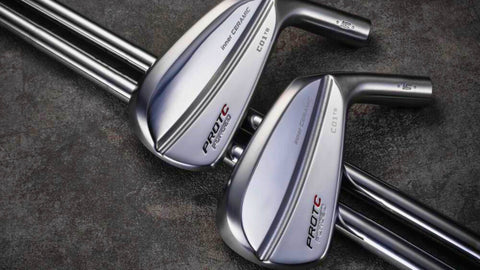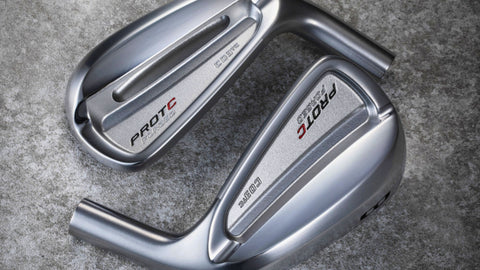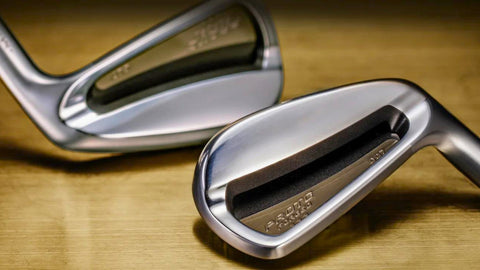A Guide to ProtoConcept Golf
When you think of Japanese golf brands, what springs to mind? It would be surprising if your first answer weren’t Mizuno, closely followed by Srixon Golf. Miura would be a...
When you think of Japanese golf brands, what springs to mind? It would be surprising if your first answer weren’t Mizuno, closely followed by Srixon Golf. Miura would be a...

When you think of Japanese golf brands, what springs to mind?
It would be surprising if your first answer weren’t Mizuno, closely followed by Srixon Golf.
Miura would be a notable name for those more into Japanese domestic market brands, but how about ProtoConcept?
While ProtoConcept is a relatively new name to most of us, it is a member of a long line of artisan forging houses in Japan that produce golf irons and golf wedges, creating some of the best-feeling golf clubs in the game.
We believe that ProtoConcept can become a significant brand beyond the shores of Japan, and we’ll explain why we think that’s the case by the following:
ProtoConcept is a partnership between Japanese forging specialists Endo and retail brand Golf Partner. This might not make the picture any clearer but bear with us.
Endo has an almost mythical status among golf gearheads after collaborating with brands such as Callaway to produce forged golf irons for its tour staff. Endo was also rumoured to be the forging artisan behind Tiger Woods’ famous Titleist 681 blades used in the Tiger Slam between 2000 and 2001.
Endo showcases its forging skills for its own golf clubs, which are sold under the Epon brand name in the US and Europe. Golf Partner is arguably the biggest golf retailer you may never have heard of, with over 400 stores and over 500,000 new and used golf clubs in stock at any given time. Golf Partner places a focus on bringing Japanese domestic market golf clubs and brands into the US.
The idea behind ProtoConcept is to produce low-volume equipment based on design and engineering principles that mass-market equipment manufacturers don’t widely use.
This idea means that ProtoConcept clubs aren’t at the cheaper end of the equipment price bracket, as we saw when another concept-based manufacturer, PXG, appeared on the scene in 2015.
We’re focusing on ProtoConcept’s irons as they best showcase Endo’s capabilities. ProtoConcept also makes wedges and a driver featuring Endo’s inputs, but they are harder to get a hold of. It’s also worth remembering that the golf driver retails at $1,100, pushing it beyond the boundaries of what golfers will pay for a driver.
With the irons, ProtoConcept has four options available to us:
ProtoConcept’s blade option. The small face length from heel to toe and a classic, thin topline put the CO1 firmly on the radar of the better player who isn’t looking for help in ball striking and prioritises feel and playability.

The CO3 TC will look similar to the CO1 TB at address, as it also features a more compact head shape with minimal offset and a thin top line. However, like most players’ cavity irons, the CO3 TC has built-in technology that will allow it to be more forgiving on off-centre hits.

The CO5 also falls into the player’s cavity model, but this golf iron could be used by a wider selection of golfers who like the look of a traditional blade at address but know that the golf club offers more forgiveness on off-centre strikes.

Virtually identical in looks to the CO5, the CO7 continues the theme of looking very traditional at address but offers a technology story that will allow it to be played by golfers of varying skill sets.

We talked earlier about the “concept” nature of the golf clubs produced by ProtoConcept by adapting different philosophies to other manufacturers.
We can see this different approach in the CO1 TB golf iron. While all bladed forged irons are formed from a heated billet of steel or carbon steel and beaten into shape using some form of hydraulic press, the CO1 TB has one major differentiating factor in its build.
Using Endo’s technical know-how, the CO1 TB golf irons have a ceramic bar inserted into the S20 carbon steel billet before going through what would be considered the normal forging process, as outlined above.
There are two key reasons for the ceramic bar:
Although carbon steel isn’t weighty, inserting the ceramic bar into the steel reduces overall weight. The saved weight is then repositioned around the perimeter of the head, giving a greater element of forgiveness.
The combination of the ceramic bar and weight saving also allows the engineers to precisely position the centre of gravity in each golf iron, which in turn maximises the ball flight performance. This means that the longer irons, which are harder to launch, receive help, while the shorter irons benefit from a powerful ball flight with optimal spin. The strategic positioning of weight and the centre of gravity is optimised using 3D CAD modelling in the CO1 TB’s design process.
The CO3 TC golf irons might not benefit from using ceramic material in the forging process. Still, this doesn’t mean ProtoConcept’s engineers have not shown initiative.
The CO3 TC irons are designed via 3D CAD modelling to hone in on the precise centre of gravity. From 4-iron to 7-iron, there is a CNC-milled small pocket cavity, which improves launch and spin. From 8-iron to Pitching Wedge, the pocket cavity is not present to optimise launch and spin, so golfers don’t need as much help on off-centre hits.
In doing so, ProtoConcept believes it has uniformly lined up the centre of gravity for each golf iron in the set, providing consistency and support where needed throughout the set. ProtoConcept has also worked on the sole of the CO3 TC to improve turf interaction compared to the previous CO3 model.
The tech story behind the CO5 is in the face design. ProtoConcept has chosen to use a slightly tougher steel in the face. This goes against normal convention because if you want to make a soft-feeling forged iron, you use the softest steel.
However, the idea behind using the SAE8655 Chrome Molybdenum steel is to create a face with variable thickness that can perform like a soft forged blade and provide assistance for off-centre hits. In the centre, the face measures 2.7mm in overall thickness, but towards the heel and toe of the face, the thickness drops to 2.4mm.
This means that shots struck from the heel or toe don’t lose much ball speed compared to shots struck out the centre of the face. This element alone is why the CO5 can appeal to a wider variety of golfers who aren’t as consistent in finding the middle of the face as professionals or elite amateur players.
While variable face thickness has been used effectively in drivers for years, it hasn’t fully translated into irons. But ProtoConcept has found a way of engineering a powerful golf iron that doesn’t look too dissimilar to a blade.
The CO5 golf irons also benefits from the same engineering detail to align the centre of gravity for each iron, meaning higher launching longer irons and shorter irons that give a more penetrating trajectory.
This is made all the easier by the weight saved by creating a traditional small cavity in the rear and using the weight saved from thinning out the toe and heel sections of the face.
CO7
The CO7 golf irons shares a similar technology story to the CO5. The same SAE8655 Chrome Molybdenum is used in the face to employ ProtoConcept’s variable face thickness idea. However, the CO7 differs slightly in that ProtoConcept has created three distinctive areas in the face with different thicknesses.
The lower section of the face is 2.7mm thick, the centre left and right sections of the face are 2.3mm, and the top section of the face is 1.8mm thick. As with the CO5, ProtoConcept has thinned out the extremities of the face to ensure a consistent level of ball speed, ensuring no severe drop-offs in distance compared to a centred strike.
The face being at its thickest at the bottom also has the effect of lowering the centre of gravity to aid launch and spin on the longer irons. The cavity in the rear of the head aids added forgiveness and the precise location of the centre of gravity.
Custom-Fitting to Maximise Your Potential
Any time you consider purchasing new golf clubs, you should see it as an investment in improving your golf game.
When you are looking at irons like the ProtoConcept range, you are looking at some of the finest forged irons available, incorporating subtle technology to enhance playability and power. ProtoConcept irons have a similar look at address with the technology changing between the CO1 TB and the CO7.
This factor is important as it allows for the creation of a blended set with a uniform look that golfers of all abilities can appreciate. The custom fitting process creates the ideal blended set of irons, and the fitters here at Golf Tech UK are experienced in working with all levels of golfers to get the most out of any equipment purchase they make.
ProtoConcept golf irons are available in five-iron to pitching wedge, so if you come for a custom-fitting session to replace your golf irons, we will look at the suitable hybrid or driving iron options from our range of manufacturers, such as TaylorMade, Callaway, and Titleist.
Taking this into account, for better players, we might use the CO3 TC in five and six iron and revert to the CO1 TB from seven iron down to pitching wedge. For higher handicap players, the CO7s could blend into the CO5s or even CO3 TCs.
We blend the set based on the numbers we see during the custom-fitting session from your existing golf clubs, then improve on those numbers through the right shaft selection and lie angle.
When fitting golf irons, as with any club, we look for consistent distance gapping, improved shot dispersion, and any distance gains. Many golfers will not be familiar with ProtoConcept golf irons. They are a specialised Japanese domestic market product, and we are one of the few outlets in the UK that has the ProtoConcept golf iron range available for custom-fitting.
Combining traditional forging techniques with cutting-edge design, engineering, and materials, ProtoConcept creates golf irons that offer some of the finest feedback and playability of any iron on the market today.
ProtoConcept irons are designed with custom fitting in mind. Golfers can achieve a consistent look and feel throughout their set by blending different models for optimal performance.
If you are thinking about changing your of golf irons, you can book yourself in for a custom-fitting session and try the ProtoConcept range of irons for yourself. You can also find ProtoConcept golf irons on the Golf Tech UK website, where you can view the full range and check out the variety of customised options available to build your ideal ProtoConcept golf iron set.
Your cart is currently empty.
Start Shopping